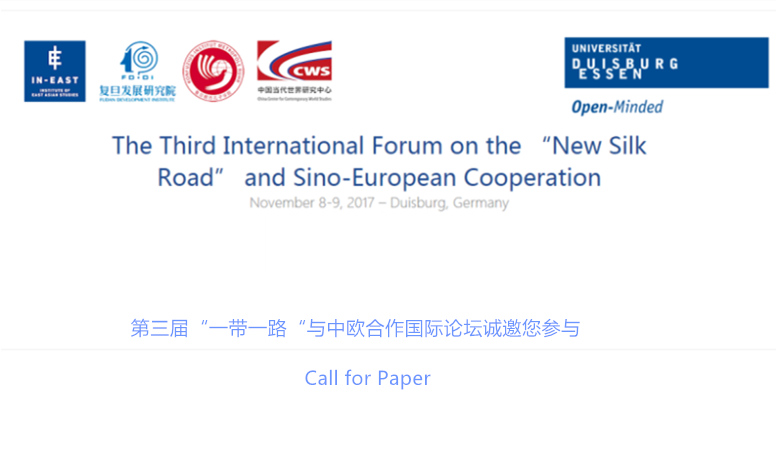作者: 发布时间:2019-09-25 17:14:18 来源:复旦发展研究院+收藏本文

第三届“一带一路“与中欧合作国际论坛将于2017年11月8日至9日在德国杜伊斯堡举行。来自中国,欧洲和一带一路沿线国家的专家学者、智库代表、政府官员、商业领袖以及知名媒体将共同探讨如何利用“一带一路”平台寻找亚欧大陆包容性增长的创新性解决方案。
本论坛由杜伊斯堡-埃森大学东亚研究院,复旦大学复旦发展研究院,中联部当代世界研究中心,鲁尔都市孔子学院联合举办。合作伙伴为北京大学国家发展研究院,杜伊斯堡市政府,杜伊斯堡港,Baltic Transport Journal。
本次论坛免费参加。
投稿截止日期为2017年9月15日。注册截止日期为2017年10月31日。入选论坛的稿件将有机会在之后的论坛出版物上发表(包括中英文书籍和期刊)。
The Third International Forum on the “New Silk Road” and Sino-European Cooperation
November 8-9, 2017, Duisburg, Germany
Preliminary, please do not circulate
Organised by:
Institute of East Asian Studies IN-EAST, University of Duisburg-Essen
Fudan Development Institute, Fudan University
Confucius Institute Metropolis Ruhr
China Center for Contemporary World Studies
Cooperative Partners:
National School of Development, Peking University
Duisburg City Hall
Duisburger Hafen AG
Media partners: Baltic Transport Journal
The Implications of the “Belt and Road Initiative” on Globalization and Inclusive Growth for the Eurasian Continent
The “Belt and Road Initiative”(BRI) and other emergent forms of transnational institution building raise new fundamental issues for economists and social scientists. New research approaches and analytical frameworks are taking shape. The Forum aims to explore the evolving scenario in a collaboration between researchers, policy makers, business people and representatives of civil society.
With the initiative evolving from rhetoric to implementation, a significant number of questions remain open and are subject to more discussions. What potential challenges, opportunities, and new conflicts may arise in the roll-out of BRI? Can the BRI become a template for a new phase of globalization? What are the geostrategic implications of BRI and how will they impact on regional and global power balances? What are the potential impacts of BRI on the economic, social and political structures in the regions along the “Belt” and “Road”?
While all these “large” questions need to be discussed and require substantial research efforts, academic research must also look into the “smaller” questions arising with the unfurling of the BRI initiative. What are the impacts of BRI on intensity and composition of regional trade flows? In how far do these changing trade flows impact on local labour markets? What is the relationship between goods flows and cross-border investment activities? Can we observe a travelling of knowledge and ideas along the new Silk Road? How do BRI activities become embedded in an institutional framework? Does the BRI contribute to the emergence of a new set of institutions fit to govern a multinational, multicultural framework for joint development and growth?
The BRI raises a plethora of highly interesting but difficult questions. Academics worldwide are challenged to contribute to unravelling the opportunities and risks emerging with the unfolding of the BRI and the possible creation of a new economic sphere spanning the Eurasian continent from its Western to its Eastern tip. The Third International Forum on the New Silk Road and Sino-European Cooperation intends to contribute to this academic debate, by bringing together the most competitive and relevant researchers as well as the major players of the Belt and Road Initiative from both sides. We invite you to submit your proposal to present a paper at the conference.
For individual submissions, abstracts should be submitted before September 15th, 2017. The abstract should include
(1) the name of the author(s),
(2) paper title and abstract,
(3) Email contacts.
You are also encouraged to organise sessions at the forum. Proposals for organised sessions are also due by September 15th, 2017. The session proposal should describe the organising theme and paper topics to be addressed. The person submitting the session will be considered the session organiser/chair.